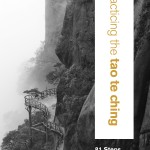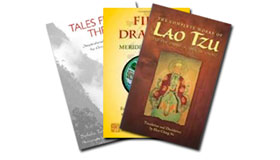Solala’s blog 4/26/15
0
One of my pet peeves in the world of Daoism is the various fantastical versions of Daode Jing are out there. Like many students of the Way I have collected various translations and versions of Laozi’s work. Of course most “translations” are not actual translations from classical Chinese but are just the authors own version of idea of what he or she thinks Laozi is saying or, even worse, what the author wants to say. In this case, the lines have very little to do with the original text but are some kind of New Age or psychological ideas that the author wants to write about. I think the idea is that if the author puts Tao Te Ching on the cover people will be fooled into buying the book, thinking they are getting the actual Tao Te Ching!
Then again, the author may be convinced that what they have to say is so much better than Laozi that they are convinced they don’t really have to hew to the actual text. (I suppose it would be better if the author said something like “inspired by the Tao Te Ching instead of passing it on as the Tao Te Ching.)
As I said, it is a pet peeve of mine and maybe I am being too literal but it seems to me that there is so much useful wisdom in Laozi’s book that we really don’t need modern people improving on it by putting it in New Age or some fanciful type of lingo.
Of course we are living in the 21st century and no is really sure who Laozi was or if he was and Tao Te Ching can be translated in different ways. But in my opinion, it really takes someone who is familiar with Daoist philosophy and practice to really understand it.
My new book, Practicing the Tao Te Ching is my “version” or my “interpretation” of the book. I am not translating it from Chinese but I have been studying these ideas and practices long enough now (25 years) that I am able to present the text in a more traditional “Daoist” sense than many modern translations.
Not only that but there are actually many practices sprinkled throughout the text that are very clear if you know how to read it. I also have used the Ho Shang Gong commentary, thought by many to be the first commentary on Laozi’s text and one that sees it in more of an internal or nei dan way rather than purely a philosophical way.
In cases where there is no practice directly taught in a chapter I have drawn from other traditional Daoist teachings. I won’t be out til spring 2016 (through Sounds True) but my hope is that it will be a very useful book for those wanting to learn Daoist practices rather than just read the book as a philosophical text. I have tried to keep to Laozi’s words without trying to improve on them. As if I could improve this wonderful timeless teaching!
Yes I am a Westerner, as many of my readers are, but the teachings and practices of Daoism cross over any cultural boundaries. After all, we all have the same qi system, the same jing, qi and shen system, the same questions about our place in the great multiverse (what the Chinese call Dao) that people everywhere wrestle with or question for hundreds if not thousands of years. The religion of Daoism has developed along a much more cultural way than the original Classic Daoism such as Laozi and Zhuangzi and few Westerners are prepared to follow it. But anyone can study Laozi and Zhuangzi and get so much wisdom from it to apply any aspect of our lives. The great Dao is same Dao in the West as in the East. But by keeping a little more closer to the original texts rather than go off on any kind of tangent people feel like labeling as Tao Te Ching I think we will benefit so much more.



Comments